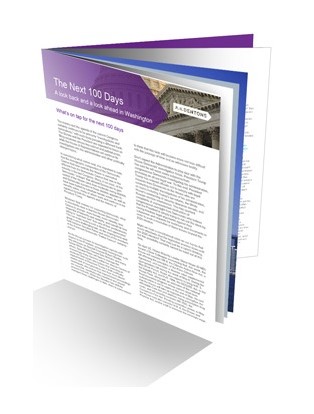The mantra and the agenda of the current Congress certainly continues to be primarily “investigations and nominations,” with each body pursuing a different track. The Senate and the President are expected to focus on filling vacancies across key cabinet and judicial posts, while the House of Representatives will continue its investigations into the administration and other politically charged topics.
In considering what comes next, it is important to note that the demographic composition of the Democratic Caucus that now controls the House is somewhat different from the Democratic Caucus that was in the minority in the last Congress. Many, if not most, of the Democratic “pickups” that allowed Democrats to gain control of the House came from moderate swing districts and Democratic success in those districts appears to have been fueled by suburban female voters, as well as minority voters, many of whom were and continue to be repulsed by both the agenda and the rhetoric of President Trump.
Whatever their motives for supporting Democrats, what is abundantly clear is that this House Democratic Caucus is younger, more female, more minority, less respectful of hierarchy and seniority, and overall far less willing to “wait their turn” than any of their predecessors. This can make leading such a diverse and opinionated group a very challenging task, as the ongoing back-and-forth between Speaker Pelosi and some of the members of the Freshman Democratic “Twitter Caucus” certainly reveals.
As the House pursues its investigative agenda with respect to the President, presumably hearing from such key witnesses as Special Counsel Robert Mueller, former White House Counsel Don McGahn and many others, Speaker Pelosi will have to manage the increasingly sharp divisions within her diverse Caucus of moderate Democrats who believe that pursuing an impeachment of President Trump is both politically unwise and at best premature and their more liberal counterparts who believe that impeachment proceedings are essential, constitutionally mandated and should proceed forthwith. While the Speaker has skilfully managed these challenges to date, there is every reason to think that this task will become more not less difficult with the passage of time and as witnesses testify.
Don’t expect the Administration to play nice with the House Democrats’ investigation focus. President Trump has said he will resist every subpoena from congressional Democrats investigating his administration, promising an all-out legal war. To this end, President Trump has ordered officials not to comply with legal requests from Democrats in the House who are conducting multiple investigations of his administration, on topics including Trump’s tax returns, the White House’s overturning of security clearance denials, and Russian election interference. This has sparked complaints of unprecedented obstruction of congressional oversight from Democrats who believe that the President is simply trying to run out the clock by raising frivolous legal arguments against their subpoenas and requests for testimony and documents in order to push a resolution of these issues beyond the 2020 election.
Might we have a constitutional crisis on our hands that would effectively shut the legislative process down until the 2020 election? That may just be a cynic’s thinking, but this possibility certainly cannot be ruled out at this time.
On April 25, House Majority Leader Steny Hoyer (D-MD) issued a Dear Colleague announcing that, this week, the House will consider HR 9, the Climate Action Now Act, a bill affirming the principles of the Paris Climate Agreement, and consider a disaster relief supplemental appropriations bill during the week of May 6. During the May Work Period, Hoyer also expects to bring H.R. 5, the Equality Act, and H.R. 1994, the SECURE Act, to the House Floor, along with an extension of the national flood insurance program whose current short-term authorization is set to expire at the end of May. He said that the House will take up legislation to strengthen the Affordable Care Act and address rising prescription drug costs, and will possibly consider HR 1500, the Consumers First Act. Pending committee action, in May the House may also consider H.R. 6, the Dream and Promise Act, and/or a bill to increase the minimum wage.
Beyond investigations and nominations, Congress does still have to address the specter of sequestration and a potential debt limit breach. The prospect of enormous statutorily mandated cuts to both defense and non-defense spending if an agreement cannot be reached certainly creates a powerful incentive for most in the Congressional leadership to reach such an agreement.
While it’s far too early to predict another government shutdown, with so many freshman members who must face the voters in 2020 for their first re-election campaign, one should assume that this lift will be even harder than the end of 2018’s spending package debacle.
See the highlights from the first 100 days.


